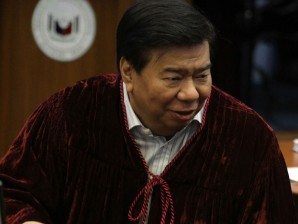Senators have reached a consensus to approve a bill amending the Anti-Money Laundering Act (Amla) and a bill against terrorist financing before adjourning on June 7, according to Sen. Franklin Drilon.
“In a caucus last Monday, the Senate leadership and all the senators agreed to pass these two measures,” Drilon told a Senate press forum.
The senators had been debating three bills proposing key amendments to the Amla, including striking out the requirement that the Anti-Money Laundering Council (AMLC) notify the owner of a bank deposit when applying for authority to inquire into that bank deposit, among other things.
Also being debated was the antiterrorist financing bill.
The Asia/Pacific Group on Money Laundering (APG) of the Financial Action Task Force (FATF) has warned AMLC officials that the Philippines would end up in the FATF blacklist if the antimoney laundering amendments were not enacted.
The FATF, the Paris-based inter-governmental body that develops and promotes policies to combat money laundering and terrorist financing, will be assessing the progress made by the Philippines when it meets in Rome from June 18 to 22, said APG executive secretary Gordon Hook.
If the Philippines has not taken “sufficient action” to implement significant components of its action plan by June, the FATF would likely “progress the Philippines” to the blacklist, and call on members to “consider the risks” arising from deficiencies in anti-money laundering and combating the financing of terrorism, Hook said.
“The effect of the Philippines being blacklisted would be very serious,” he said in a May 18 letter to Amando Tetangco Jr., the AMLC chairman and Bangko Sentral ng Pilipinas governor.
Drilon said being blacklisted would have serious implications on Filipinos working overseas, particularly on their money.
One of the sanctions would be enhanced examination of the remittances, he said.
“Remember that the cardinal rule in the banking system is KYC (know your customer). They can use this principle in order to justify an enhanced extensive investigation for every remittance done by overseas Filipino workers. If we are placed in the blacklist and with the enhanced investigation, that will discourage the workers from going to the banks and the regular banking system and resort to the informal sector with all the dangers of the remitted amount being lost and the adverse effects on the economy of these dollars not being included in our gross international reserves,” he said.
